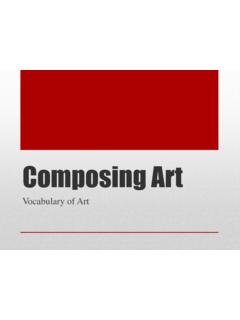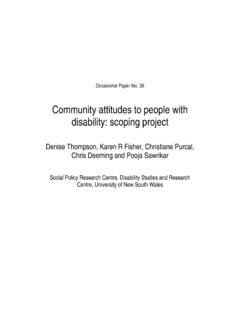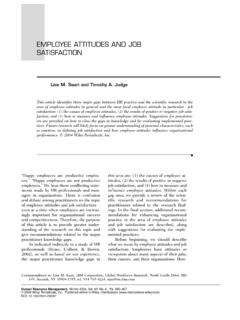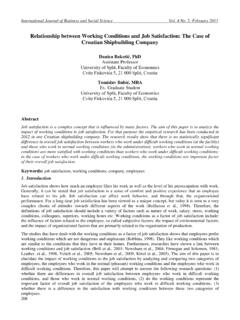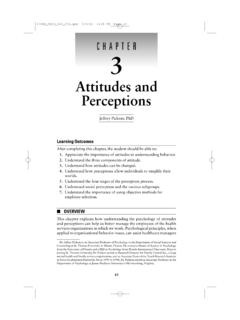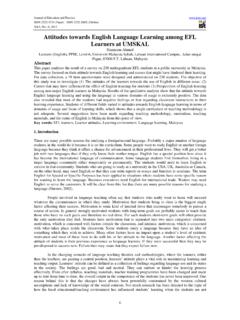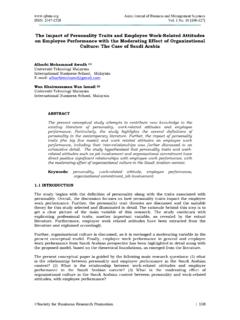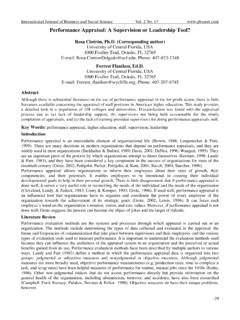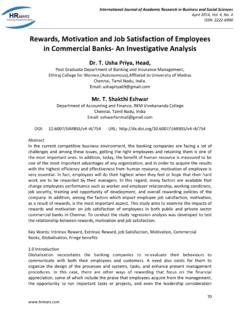Transcription of Perceived Organizational Support: A Review of the Literature
1 Perceived Organizational Support: A Review of the LiteratureLinda Rhoades and Robert EisenbergerUniversity of DelawareThe authors reviewed more than 70 studies concerning employees general belief that their workorganization values their contribution and cares about their well-being ( Perceived Organizational support;POS). A meta-analysis indicated that 3 major categories of beneficial treatment received by employees( , fairness, supervisor support, and Organizational rewards and favorable job conditions) wereassociated with POS. POS, in turn, was related to outcomes favorable to employees ( , job satisfaction,positive mood) and the organization ( , affective commitment, performance, and lessened withdrawalbehavior).
2 These relationships depended on processes assumed by Organizational support theory:employees belief that the organization s actions were discretionary, feeling of obligation to aid theorganization, fulfillment of socioemotional needs, and performance-reward whom much is given, much will be required. Luke 12:48 (New King James Version)Employers commonly value employee dedication and who are emotionally committed to the organizationshow heightened performance, reduced absenteeism, and a less-ened likelihood of quitting their job (Mathieu & Zajac, 1990;Meyer & Allen, 1997; Mowday, Porter, & Steers, 1982).
3 Bycontrast, employees are generally more concerned with the orga-nization s commitment to them. Being valued by the organizationcan yield such benefits as approval and respect, pay and promo-tion, and access to information and other forms of aid needed tobetter carry out one s job. The norm of reciprocity allows employ-ees and employers to reconcile these distinctive exchange theorists have alluded to employment as thetrade of effort and loyalty for tangible benefits and social rewards( , Bateman & Organ, 1983; Brief & Motowidlo, 1986; Etzioni,1961; Gould, 1979; Levinson, 1965; March & Simon, 1958; Mow-day et al.)
4 , 1982; Organ & Konovsky, 1989; Steers, 1977). Whenone person treats another well, the reciprocity norm obliges thereturn of favorable treatment (Gouldner, 1960). To the extent thatboth the employee and the employer apply the reciprocity norm totheir relationship, favorable treatment received by either party isreciprocated, leading to beneficial outcomes for (Eisenberger,Huntington,Hutchison, & Sowa, 1986; Shore & Shore, 1995) supposes that todetermine the organization s readiness to reward increased workeffort and to meet socioemotional needs, employees developglobal beliefs concerning the extent to which the organizationvalues their contributions and cares about their well-being.
5 Per-ceived Organizational support (POS) is also valued as assurancethat aid will be available from the organization when it is neededto carry out one s job effectively and to deal with stressful situa-tions (cf. George, Reed, Ballard, Colin, & Fielding, 1993). Morethan 70 empirical studies have focused on POS; however, theliterature has not been systematically reviewed. In this article weexamine the theoretical framework guiding research on POS, con-sider studies of POS s hypothesized antecedents and conse-quences, and evaluate evidence on the processes assumed to un-derlie these Support TheoryAccording to Organizational support theory, the development ofPOS is encouraged by employees tendency to assign the organi-zation humanlike characteristics (Eisenberger et al.)
6 , 1986). Levin-son (1965) noted that actions taken by agents of the organizationare often viewed as indications of the organization s intent ratherthan attributed solely to the agents personal motives. This per-sonification of the organization, suggested Levinson, is abetted bythe organization s legal, moral, and financial responsibility for theactions of its agents; by Organizational policies, norms, and culturethat provide continuity and prescribe role behaviors; and by thepower the organization s agents exert over individual the basis of the organization s personification, employees viewtheir favorable or unfavorable treatment as an indication that theorganization favors or disfavors exchange theorists argue that resources received fromothers are more highly valued if they are based on discretionarychoice rather than circumstances beyond the donor s control.
7 Suchvoluntary aid is welcomed as an indication that the donor genu-inely values and respects the recipient ( , Blau, 1964; Cotterell,Eisenberger, & Speicher, 1992; Eisenberger, Cotterell, & Marvel,1987; Gouldner, 1960). Thus, Organizational rewards and favor-able job conditions such as pay, promotions, job enrichment, andinfluence over Organizational policies contribute more to POS ifthe employee believes that they result from the organization svoluntary actions, as opposed to external constraints such as unionnegotiations or governmental heath and safety regulations ( et al.)
8 , 1986; Eisenberger, Cummings, Armeli, &Lynch, 1997; Shore & Shore, 1995). Because supervisors act asorganizational agents, the employee s receipt of favorable treat-ment from a supervisor should contribute to POS. The strength ofLinda Rhoades and Robert Eisenberger, Department of Psychology,University of concerning this article should be addressed to RobertEisenberger, Department of Psychology, University of Delaware, Newark,Delaware 19716. E-mail: of Applied PsychologyCopyright 2002 by the American Psychological Association, , Vol. 87, No. 4, 698 7140021-9010/02/$ DOI: relationship depends on the degree to which employees iden-tify the supervisor with the organization, as opposed to viewing thesupervisor s actions as idiosyncratic (Eisenberger, Stinglhamber,Vandenberghe, Sucharski, & Rhoades, in press).
9 Organizational support theory also addresses the psychologicalprocesses underlying consequences of POS. First, on the basis ofthe reciprocity norm, POS should produce a felt obligation to careabout the organization s welfare and to help the organization reachits objectives. Second, the caring, approval, and respect connotedby POS should fulfill socioemotional needs, leading workers toincorporate Organizational membership and role status into theirsocial identity. Third, POS should strengthen employees beliefsthat the organization recognizes and rewards increased perfor-mance ( , performance-reward expectancies).
10 These processesshould have favorable outcomes both for employees ( , in-creased job satisfaction and heightened positive mood) and for theorganization ( , increased affective commitment and perfor-mance, reduced turnover).An appealing feature of Organizational support theory is that itprovides clear, readily testable predictions regarding antecedentsand outcomes of POS along with specificity of assumed processesand ease of testing these processes empirically. We examine stud-ies that consider POS s hypothesized antecedents and conse-quences and more elaborated studies of the mechanisms presumedto underlie these Support s Dimensionality andDiscriminant ValidityConsistent with the view that employees form a general beliefregarding the organization s commitment to them, Eisenberger etal.
